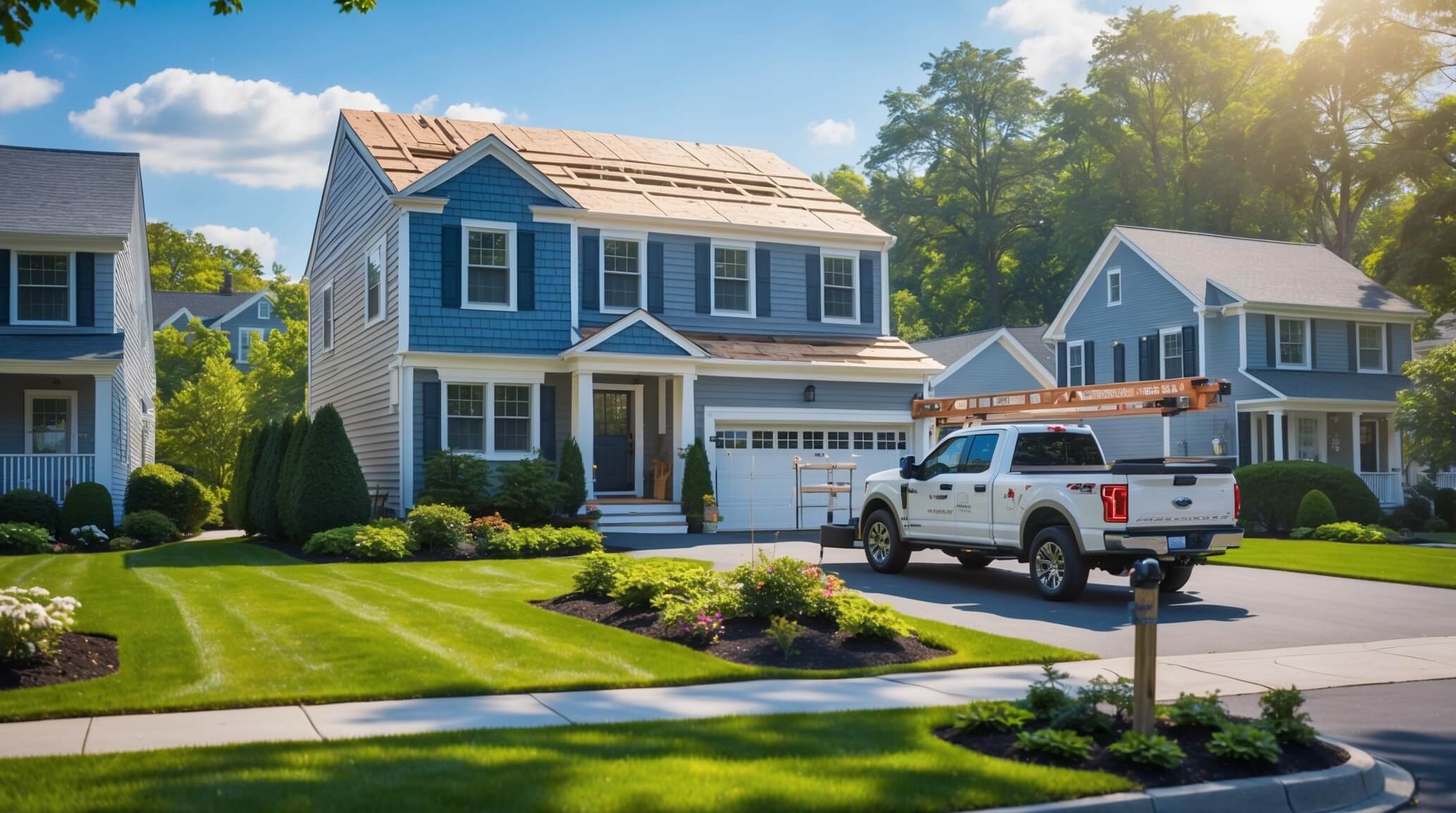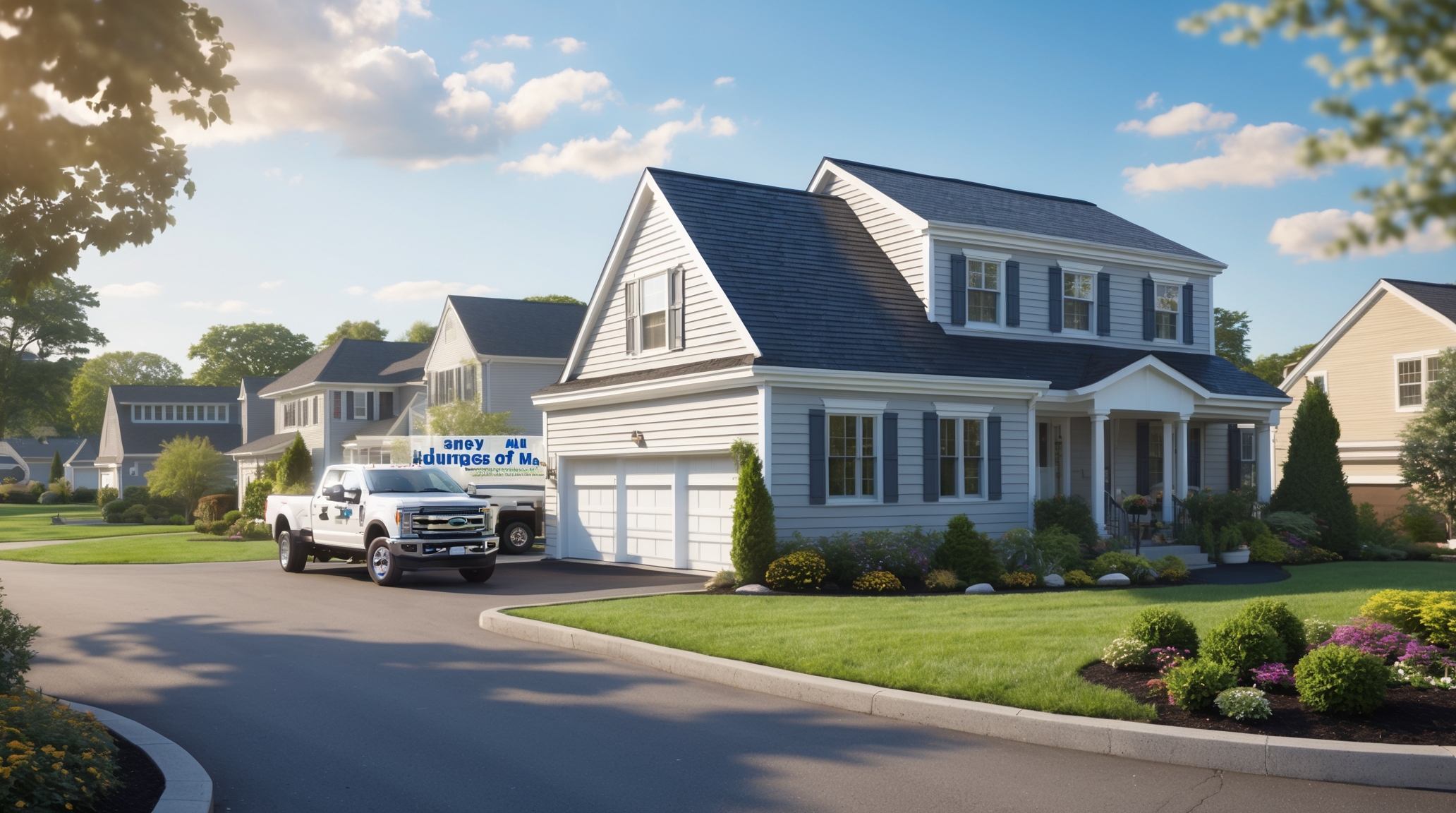Home remodeling permits Massachusetts are necessary approvals for renovations, expansions, or repairs to ensure compliance with local building codes.
If you’re a homeowner or real estate investor in Massachusetts planning to renovate, understanding home remodeling permits Massachusetts is crucial.
Navigating the complexities of construction permits can be daunting, but it doesn’t have to be.
In this guide, you’ll discover what permits you need, how to apply for them, and tips for working with contractors to ensure your projects comply with state regulations. Get ready to turn your renovation dreams into reality!
Essential Guide to Home Remodeling Permits in Massachusetts
Navigating the world of home remodeling can be both exciting and overwhelming, especially when it comes to understanding the necessary permits involved. In Massachusetts, securing the right home remodeling permits is crucial to ensure that your project complies with local regulations and safety standards.
Understanding the Permit Process
When planning a home renovation, it’s essential to start by determining what kind of permits you may need. This often depends on the scope of your project. For instance, if you are looking to undertake kitchen remodeling Boston MA, you might need a building permit if you’re making structural changes or altering plumbing and electrical systems. On the other hand, minor cosmetic updates may not require a permit.
- Building Permits: These are typically required for larger projects such as additions, major renovations, or any structural changes.
- Renovation Permits: If you are making changes to the interior or exterior of your home, such as updating bathrooms or kitchens, you may need a renovation permit.
- Electrical and Plumbing Permits: Any work involving electrical wiring or plumbing systems usually requires specific permits to ensure safety and compliance.
How to Apply for Permits
Applying for construction permits Massachusetts often involves a multi-step process. Start by visiting your local building department’s website or office to access the necessary application forms. You may need to provide detailed plans of your project, including drawings and specifications.
It can be beneficial to consult with home renovation contractors Massachusetts who are familiar with the local permitting process. They can guide you through the paperwork and help avoid potential pitfalls. Additionally, reliable contractors in Massachusetts can offer insights into any specific requirements for your area.
Common Challenges and Tips
One of the most common challenges homeowners face during the permitting process is navigating the various regulations and ensuring that all work complies with local codes. To mitigate this, consider the following tips:
- Research Local Regulations: Each municipality may have different requirements regarding permits. It’s essential to familiarize yourself with these before starting your project.
- Keep Detailed Records: Maintain a file of all permits, plans, and correspondence with local authorities. This can be invaluable should any issues arise in the future.
- Communicate with Your Contractor: Ensure that your chosen contractor is aware of the permitting requirements and is proactive in obtaining the necessary approvals.
By understanding the ins and outs of the building permit Massachusetts process, you can set your home remodeling project up for success. Whether you’re embarking on a major renovation or simply updating your bathroom, taking the time to secure the right permits will ultimately protect your investment and enhance your home.
Step-by-Step Process for Securing Remodeling Permits
When embarking on a home remodeling project, especially in Massachusetts, understanding the process of securing the necessary permits is crucial. This ensures that your renovation not only enhances the aesthetics of your home but also complies with local regulations. Let’s walk through the steps to make this process smoother.
1. Research Local Requirements
The first step in securing your home remodeling permits is to familiarize yourself with the local building codes and zoning laws. Each municipality may have different requirements, so it’s essential to check with your local building department. This information will provide insight into what types of projects require permits and any specific guidelines you need to follow.
- Visit your town’s official website for resources.
- Contact your local building department or zoning office for clarification.
2. Determine the Scope of Your Project
Next, clearly outline the scope of your renovation. Are you planning a simple update, like a bathroom remodeling, or something more extensive, such as a home expansion? The size and nature of the project will dictate which permits are needed. For instance, structural changes often require more extensive documentation than cosmetic updates.
3. Prepare Your Documentation
Gather all necessary documents to support your permit application. This may include:
- Detailed project plans or blueprints, which can often be created with the help of home renovation contractors Massachusetts.
- Site plans that show property boundaries and existing structures.
- Specifications for materials you plan to use.
Being thorough in your documentation can expedite the review process.
4. Submit Your Application
Once you have everything prepared, it’s time to submit your application. This often involves filling out specific forms provided by your local authority and paying any associated fees. Ensure that all your documentation is included to avoid delays.
5. Await Review and Approval
After submission, your application will undergo a review process. Depending on the complexity of your project, this can take some time. During this period, the building department might reach out for additional information or clarification. Stay responsive to any inquiries to keep things moving along.
6. Obtain Your Permit
Once your application is approved, you will receive your building permit Massachusetts. This document is essential before commencing work. Make sure to keep this permit visible on-site during your home renovation, as inspectors may want to verify it at various stages of the project.
7. Schedule Inspections
As your project progresses, you may need to schedule inspections at different phases to ensure compliance with local codes. These inspections are important for confirming that the work is being done correctly and safely.
- Coordinate with your remodeling services Massachusetts provider to schedule these inspections.
- Be prepared for the inspector to check structural integrity, electrical systems, and plumbing, depending on your project.
8. Final Approval
Upon successful completion of the inspections, you’ll receive final approval. This is a vital step that assures you’ve completed the project according to plan, and it may be required if you later sell your home or pursue real estate investment in Massachusetts.
Following these steps will help you navigate the often-complex world of remodeling permits with confidence. By being informed and organized, you can ensure that your home improvement project runs smoothly and adheres to all local regulations. Whether you’re considering kitchen remodeling Boston MA or working with roofing contractors Worcester MA, understanding the permit process is key to a successful renovation.
Key Regulations Affecting Home Renovations in Massachusetts
When embarking on a home renovation project in Massachusetts, understanding the key regulations is essential. These guidelines not only keep your project compliant but also ensure the safety and integrity of your home. The state is known for its rich history and diverse architecture, meaning that renovations can range from restoring historic homes to modern upgrades. Therefore, it’s vital to be informed about the home remodeling permits Massachusetts and other related regulations that could influence your project.
Understanding Home Renovation Permits
In Massachusetts, most home renovations require a building permit Massachusetts. This includes significant changes such as structural modifications, electrical work, plumbing alterations, and even some cosmetic updates. Before commencing any work, it is advisable to check with your local building department to determine what permits are necessary for your specific project. Engaging with home renovation contractors Massachusetts can also provide clarity on these requirements, as they often have experience navigating local regulations.
Zoning Laws and Codes
Local zoning laws play a crucial role in home renovations. These regulations dictate what changes can be made to your property, including setbacks, height restrictions, and land use. If you’re considering a home expansion or significant structural changes, familiarizing yourself with the zoning codes in your area is a must. Each city or town may have different regulations, and understanding these can save you time and potential fines.
- Setback requirements: These determine how far your structure must be from property lines.
- Height restrictions: These limit how tall your home can be.
- Land use regulations: These dictate what types of renovations are permissible based on your neighborhood.
Working with reliable contractors in Massachusetts can help ensure compliance with these zoning laws, preventing any costly setbacks during your renovation.
Historical Preservation Guidelines
For homeowners in historic districts, additional regulations may apply. Massachusetts has strict guidelines aimed at preserving the character of historic homes and neighborhoods. If your property is in a designated historic area, you’ll need to adhere to specific standards for renovations, which might include using certain materials or maintaining original architectural features. Consulting with renovation permits Massachusetts experts can help you navigate these rules effectively.
Health and Safety Regulations
Safety is paramount in any renovation project. Massachusetts has specific health and safety codes that must be followed, especially concerning electrical and plumbing work. Compliance not only ensures the safety of your home but also protects you from potential legal issues down the line. Engaging experienced home maintenance contractors Massachusetts can help guarantee that all work adheres to these vital regulations.
Final Inspections and Compliance
Once your renovation is complete, it’s important to obtain a final inspection from your local building department. This step verifies that all work was done according to the approved permits and complies with local codes. Failing to secure this inspection can lead to complications if you decide to sell your home or undertake further renovations in the future.
In conclusion, navigating the regulations surrounding home renovations in Massachusetts requires careful planning and awareness of local laws. By understanding the necessary home remodeling permits Massachusetts, zoning laws, and health and safety codes, you can ensure a smoother renovation process. Working with knowledgeable professionals in the field will not only help you stay compliant but can also enhance the overall success of your home improvement journey.
Understanding Permit Fees and Timelines for Renovation Projects
When embarking on a renovation journey in Massachusetts, grasping the intricacies of home renovation permits Massachusetts is crucial. Not only do these permits ensure that your project complies with local codes, but they also play a significant role in determining the fees and timelines associated with your renovation.
Permit Fees: What to Expect
Permit fees can vary widely based on the scope of your renovation. Generally, the cost of a building permit in Massachusetts is influenced by several factors, including the type of work being done and the total valuation of the project. For instance, a simple bathroom remodeling may incur lower fees compared to extensive kitchen remodeling Boston MA, which often involves structural changes and higher costs.
Here’s a brief overview of typical costs you might encounter:
- Minor renovations: These projects typically attract lower fees, often ranging from $50 to a few hundred dollars.
- Major renovations: Larger projects, such as home expansions or significant interior renovations, can result in fees from several hundred to thousands of dollars.
- Additional costs: Don’t forget to factor in costs for inspections and potential revisions to plans, which may add to your overall budget.
Timelines: Planning Your Renovation
Understanding the timeline for obtaining permits is essential for effective project management. The process can vary based on the municipality and the complexity of your project. In many cases, here’s what you can expect:
- Preparation of documents: Gathering the necessary documentation and plans can take a few days to several weeks, depending on the readiness of your materials.
- Submission and review: Once submitted, permit applications typically undergo a review period that can last anywhere from a week to several months. This is where having reliable contractors in Massachusetts can make a difference, as they can help ensure all paperwork is in order.
- Approval and issuance: After the review, if everything meets the requirements, you’ll receive your permit. This stage can take additional time if revisions are needed.
Working with Professionals
To navigate the complexities of renovation permits Massachusetts, enlisting the help of experienced home renovation contractors Massachusetts can streamline the process. These professionals are familiar with local regulations and can assist in ensuring compliance, ultimately saving you time and potential complications. Additionally, they can provide insights into timelines and help manage your project effectively.
In the current real estate landscape, understanding the nuances of renovation projects, including permit fees and timelines, is vital for successful property investment. Whether you’re considering bathroom remodeling or a complete home overhaul, being informed can empower you to make the best decisions for your project.
Choosing the Right Contractor: What to Look For
When planning a home renovation, selecting the right contractor can make all the difference. This decision not only influences the quality of your project but can also affect your overall experience throughout the renovation process. With so many options available, it’s essential to know what to look for to ensure you end up with a reliable and skilled professional.
Evaluate Credentials
Before anything else, check the contractor’s credentials. This includes verifying their license and insurance. In Massachusetts, home renovation contractors Massachusetts must hold the necessary licenses to operate legally. Ensure they have general liability insurance and worker’s compensation coverage to protect you from potential liabilities.
Experience Matters
Next, consider the contractor’s experience in the specific type of renovation you are planning. Whether it’s kitchen remodeling Boston MA, bathroom renovations, or even more extensive home expansions, a contractor who specializes in your desired project type will bring valuable expertise. Ask about their past projects and seek examples of their work to gauge their capability.
Read Reviews and Testimonials
In today’s digital age, online reviews can provide insight into a contractor’s reputation. Look for testimonials on their website and third-party review sites. Positive feedback from previous clients can be a good indicator of a contractor’s reliability and quality of work. Additionally, consider asking for references directly from the contractor to speak with past clients about their experiences.
Communication is Key
Effective communication is crucial for a successful renovation project. Pay attention to how promptly and clearly a contractor responds to your inquiries. A good contractor should listen to your ideas, provide feedback, and keep you informed throughout the process. This transparency can help avoid misunderstandings and ensure that your vision aligns with their execution.
Get Multiple Estimates
Don’t settle on the first contractor you meet. Obtaining multiple estimates allows you to compare pricing, services, and timelines. However, be cautious of estimates that seem unrealistically low, as they may indicate corners being cut. Look for a contractor who offers a reasonable balance between cost and quality.
Understanding the Contract
Once you’ve selected a contractor, it’s vital to understand the terms of the contract fully. Ensure it includes detailed information about the scope of work, payment schedule, materials to be used, and timelines for completion. If there are any uncertainties, don’t hesitate to ask for clarification. A well-defined contract can help prevent disputes and protect your interests.
Permits and Regulations
Lastly, ensure that your chosen contractor is knowledgeable about local regulations and permits, including building permit Massachusetts requirements. Renovation projects often require specific permits, and a reliable contractor should assist you in navigating this process. They should be familiar with the necessary steps to secure the appropriate home renovation permits Massachusetts, ensuring that your project is compliant with local laws.
By taking the time to thoroughly evaluate potential contractors, you are investing in the success of your home renovation. A well-chosen contractor will not only bring your vision to life but will also make the journey enjoyable and stress-free.
Common Mistakes to Avoid When Applying for Remodeling Permits
When embarking on a home improvement project, navigating the world of remodeling permits can be a daunting task. In Massachusetts, where regulations can be strict, avoiding common pitfalls is crucial for a smooth process. Understanding these mistakes will help ensure your renovation runs efficiently and stays within legal boundaries.
Neglecting to Research Local Regulations
One of the first missteps homeowners make is failing to thoroughly research local regulations regarding home renovation Massachusetts. Each town or city may have its own specific rules, and what applies in one area might not in another. Take the time to understand the zoning laws, building codes, and any special requirements for your locality.
- Check with your local building department for updated regulations.
- Consult resources or local forums where homeowners share their experiences.
Overlooking Permit Types
Another frequent error is not recognizing the different types of building permit Massachusetts required for specific projects. While some homeowners assume that a single permit covers all aspects of their renovation, this is often not the case. For example, a kitchen remodeling Boston MA project might require separate permits for electrical, plumbing, and structural changes.
- List all the aspects of your renovation to identify necessary permits.
- Ask your contractor or local officials for guidance on specific requirements.
Failing to Provide Complete Documentation
Inadequate documentation is a major reason applications get denied or delayed. Many applicants overlook the importance of submitting complete plans, drawings, and any required supplemental information. Ensure that your application is thorough to avoid unnecessary setbacks.
- Include detailed drawings and specifications of your renovation.
- Double-check that all required forms are filled out correctly.
Ignoring Timelines
Timing is everything when it comes to securing permits for your project. Homeowners often underestimate the time it takes to obtain approvals, which can lead to frustration and delays. Be proactive by submitting your applications well in advance of your planned start date.
- Consider the time needed for revisions and resubmissions.
- Communicate with your contractor about potential timelines for obtaining permits.
Choosing the Wrong Contractor
Selecting a contractor without verifying their qualifications can lead to complications later on. Ensure that the contractor you choose is knowledgeable about renovation permits Massachusetts and has experience in navigating the permitting process. Reliable contractors in Massachusetts will often have established relationships with local authorities, aiding in the approval process.
- Ask for references and check their previous work.
- Verify that they are licensed and insured to operate in your area.
Underestimating Costs
Many homeowners fail to account for the costs associated with obtaining permits. Permit fees can vary widely based on the scope of the project and location. It’s essential to factor these costs into your overall budget to avoid surprises down the road.
- Research typical permit fees for your specific renovations.
- Include a buffer in your budget for unexpected expenses related to permits.
Avoiding these common mistakes can significantly streamline your experience with home remodeling permits in Massachusetts. By taking the time to educate yourself, prepare thoroughly, and collaborate with the right professionals, you can ensure that your renovation project proceeds without a hitch, allowing you to focus on transforming your home into the space you envision.
The Importance of Permits in Protecting Your Property Value
When considering a home renovation, securing the right permits is a crucial step that can significantly influence your property value. Home renovation permits Massachusetts serve as a safeguard, ensuring that any modifications comply with local building codes and regulations. This compliance not only protects your investment but also enhances the overall safety and livability of your home.
Ensuring Quality and Compliance
Permits are designed to uphold building standards that protect both the homeowner and the community. When you engage in projects such as kitchen remodeling Boston MA or a new roof installation with roofing contractors Worcester MA, having the proper permits ensures that the work is done correctly. This includes adherence to safety standards, which helps to prevent future issues that could arise from subpar construction practices.
Enhancing Property Value
Investing in renovations without permits can lead to complications down the road. Unpermitted work may not only decrease your home’s marketability, but it can also result in costly fines or the need to undo the work entirely. On the other hand, properties that have undergone renovations with the proper building permit Massachusetts often see an increase in value. Potential buyers appreciate the peace of mind that comes from knowing all updates were completed legally and with the necessary oversight.
Protecting Your Investment
In the current real estate climate, where buyers are more discerning, having a home that is compliant with local regulations can set your property apart. It’s an assurance that your home has been well-maintained and that any enhancements—be it a bathroom remodeling project or an extension—are legitimate. This can be a significant selling point when you decide to enter the market.
The Role of Reliable Contractors
Choosing the right contractor is essential in navigating the permit process effectively. Reliable contractors in Massachusetts are well-versed in local regulations and can guide you through obtaining the necessary permits for your project. This expertise not only streamlines the renovation process but also helps avoid common pitfalls that could jeopardize your property’s value.
Conclusion: A Wise Investment
In essence, obtaining the necessary permits is not just a bureaucratic hurdle; it is a vital part of protecting your home’s value. By following the correct procedures and working with experienced home renovation contractors Massachusetts, you can ensure that your renovations contribute positively to your investment. Whether you are considering a simple update or a major renovation, remember that proper permits are key to safeguarding your property’s future.
Staying Updated: Changes in Home Remodeling Regulations
As homeowners embark on renovation projects, understanding the evolving landscape of regulations is crucial for a successful outcome. The home renovation Massachusetts scene is continuously adapting, and staying informed about these changes can make all the difference. Regulations can vary significantly from one locality to another, and being aware of updates ensures that your project complies with local laws, ultimately safeguarding your investment.
Why Regulations Change
Regulations surrounding home remodeling are often influenced by a variety of factors, including safety standards, environmental considerations, and community aesthetics. As communities grow and change, so too do the needs and expectations for housing. For instance, in urban areas like Boston, regulations may tighten around zoning and construction practices to accommodate an increasing population while ensuring public safety and the preservation of neighborhood character.
Key Changes to Watch
In the present landscape, several notable changes have emerged that homeowners and contractors should be mindful of:
- Building Codes: Updates to building codes often reflect advancements in safety and energy efficiency. Homeowners planning major renovations, such as kitchen remodeling Boston MA or bathroom remodeling, should consult these codes to ensure compliance.
- Zoning Laws: Changes in zoning laws can affect the types of renovations permitted in certain areas. For example, residential expansions may have specific height or setback requirements.
- Permit Requirements: The process for obtaining a building permit Massachusetts can change, including the documentation needed and the time taken for approvals. Understanding these changes early can prevent delays in your project timeline.
Staying Informed
To stay updated on these changes, homeowners can utilize various resources. Local government websites often publish information about recent regulatory adjustments. Additionally, engaging with reliable contractors in Massachusetts can provide insights into the latest best practices and compliance requirements. These professionals often attend workshops and training sessions to stay abreast of changes, making them invaluable partners in your renovation journey.
Consulting Professionals
When considering renovations, collaborating with home renovation contractors Massachusetts can streamline the process. These experts not only understand the latest regulations but also possess the experience to navigate the permit application process effectively. Their knowledge about construction permits Massachusetts ensures that all necessary documentation is prepared correctly, minimizing the risk of project delays.
In the current environment, homeowners are also encouraged to seek out information on property flipping tips Massachusetts or home maintenance contractors Massachusetts, as these insights can provide additional context on how regulations might impact your renovation plans. Whether you’re looking into home expansion services Massachusetts or simply seeking advice on effective remodeling strategies, staying informed is key to a successful project.

At Builders RD, our editorial team is made up of construction professionals, researchers, and local content strategists who specialize in home improvement, permitting, and contractor services across Massachusetts. We work closely with industry experts, licensed contractors, and municipal guidelines to deliver accurate, actionable content that helps homeowners, investors, and builders make confident decisions.
Our mission is to simplify the construction process through trustworthy guidance — from permit applications to hiring the right team — so you can build smarter, safer, and with full peace of mind.
— Builders RD Editorial Team






